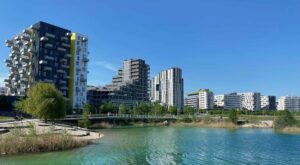(Editor’s note: This is the first post in a series about Europe’s emerging tech hubs. Hubs will be ranked by multiple metrics including number of Unicorns and exits, investment levels and special visas for talent. Terry Boyd also contributed to this post.)
Despite perpetually trailing the Americans, Europe has a lot of tech hubs including Eindhoven, Berlin, Munich, London, Amsterdam and Stockholm. But those cities are maxed out, with critical housing shortages and tight labor markets.
Just having the talent to build your startup or scale-up increasingly is an issue.
About 75 per of employers in 21 European countries could not find workers equipped with the right skills in 2023, according to ManpowerGroup, a global workforce solutions company. This was up from 42 percent in 2018, an increase of 33 percentage points. And there’s no sign of demand for skilled workers slowing any time soon.
So, where are tomorrow’s tech hubs forming?
Croatia is the surprise entry on our list, but a strong one mostly due to the amazing success of Mate Rimac and his super car company Rimac Group, based outside of Zagreb. In June, 2022, a syndicate that includes Porsche, SoftBank and Goldman Sachs invested 500 million euros in Rimac, which also took over supercar brand Bugatti from Volkswagen.
Rimac both builds its own cars, and supplies advanced batteries to other automotive OEMs.
Rimac is building a new 200 million euro headquarters in Zagreb, with the first stage completed last year.
Yet, Croatia is still tethered to tourism, which accounts for 20 percent of its GDP.
Tourism both frees and shackles Croatia. It allows it to make money in a way that has been traditional for decades, but it also cements a certain reputation. It means that global eyes struggle to have any other impression of it. The closer a destination is to the land of hotels and private apartments, the more difficult it is to alter this perception.
Still not at the level of certain European countries, basic salaries for engineers and those working on the software and tech scene in Croatia are now firmly over 1,000 euros per month, with many earning far more. Increased international presence in the form of talented digital nomads, European Union funding and more is also helping to cork the exodus from the region.
Zagreb
Rimac was a paradigm shift for Zagreb … and the reason it makes our list. The company went from a guy converting a BMW to electric power in 1997 to being a major auto supplier and owner of Bugatti supercars, the fast street-legal cars in the world.
That was just the beginning.
In the past year, Zagreb has seen more exits than the Netherlands.
Zagreb has two major innovation centers:
• ZICER Innovation Center – ZICER provides individualised consulting sessions to would-be entrepreneurs at various stages of startup development. Notable is Sportreach, which uses data analysis to enable coaches to analyse and train the motor and cognitive abilities of athelets.
• Technology Park Zagreb – Founded in 1994 during the Yugoslav Civil War, Technology Park Zagreb has incubated more than 100 companies.
Two notable exits are:
• Photomath, created by Croatian entrepreneur Damir Sabol in Zagreb back in 2015, then sold to Google in May 2023.
• Amodo, an InsureTech startup, was sold to the world’s strongest player in the field of telematics – Boston-based company Cambridge Mobile Telematics (CMT).
The European Union is funding most of the innovation, but with a number of exits, that promises to shift to the private sector.
Project 3 Mobility, a Zagreb-based startup developing an autonomous electric vehicle, infrastructure, and mobility service, closed a Series A investment round earlier this year. Project 3 Mobility has raised a total of million from private investors including from Kia and at least one sovereign fund, according to EU-Startups.
Split
Split is Croatia’s second largest city which thrives within the ancient walls of Roman Emperor Diocletian’s palace. Surrounded by sun drenched islands and lapped by the Adriatic, Split is synonymous with the Mediterranean climate that lures Vitamin D-deprived northern Europeans each summer. Making more headlines for expensive ice cream than for tech, the tide is turning for this coastal gem.
Among the strongest players in this turn towards tech is Split Tech City, a Mediterranean Tech Hub that describes itself as “being dedicated to connecting and promoting Split’s tech community and encouraging its development.”
Offering content on Split’s startups, co-working spaces, digital nomads and internationals, Split Tech City was founded in 2010 and is the first formal association which brings together players within the city’s tech community. This includes startups and individuals, as well as associations and institutions involved in positioning Split on the growing European tech map.
It has to be said that Split’s tech and startup ecosystem isn’t as advanced as those elsewhere in Croatia are – and that’s not owing to a lack of passion or drive. It’s because of one thing – tourism.
Split isn’t at Zagreb’s level for this reason, but it won’t be long before it catches up.
In addition to Split Tech City, other initiatives have sprung up – such as Digitalna Dalmacija (Digital Dalmatia). Digitalna Dalmacija was the first Dalmatian startup acceleration programme to provide the region’s startup scene with a spring in its step through education, mentoring and ultimately – capital.
Other regions:
Once known as the breadbasket of Yugoslavia, the Slavonia region is now home to a number of advanced startups including:
• augmented reality startup SPECTREXR
• first-person view drone startup Orqa.
• robotics startup Gideon.
Now, let’s look at the data.
Cost of living
The cost of living is dramatically lower in Croatia than in other European tech hubs such as Paris, Eindhoven and Berlin. For this series, we’re going to use Berlin as the benchmark because there’s sufficient data for comparison.
Overall, it costs 40 percent more to live in Berlin than Zagreb, according to Numbeo.
Rent for a 3-bedroom apartment in the center of Berlin will cost you 113.5 percent more than a comparable apartment in the center of Zagreb, 2,428 euros per month in Berlin versus 1,133 per month in Zagrab.
Available jobs
Lots, according to Linkedin. See the latest here.
Wages
The average wage for a computer engineer in Croatia is about 30,000 euros per year.
The average wage for a computer engineer in Berlin is 68,000 per year, according to Glassdoor.
––––––––––
See more about Croatia here in Dispatches’ archives

Lauren Simmonds
Lauren Simmonds is the editor of Total Croatia News, the largest English language portal in Croatia. She lives in Zagreb, Croatia, and is a translator, content writer, interpreter and the co-author of "Croatia - A Survival Kit for Foreigners," which was published in 2022.














